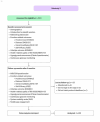Empowering Caregiver Well-Being With the Adhera Caring Digital Program for Family Caregivers of Children Living With Type 1 Diabetes: Mixed Methods Feasibility Study
- PMID: 40632783
- PMCID: PMC12266296
- DOI: 10.2196/66914
Empowering Caregiver Well-Being With the Adhera Caring Digital Program for Family Caregivers of Children Living With Type 1 Diabetes: Mixed Methods Feasibility Study
Abstract
Background: Caregivers of children living with type 1 diabetes (T1D) face multiple challenges that significantly impact their mental health and quality of life. The well-being of caregivers directly affects the management of the child's condition. The Adhera Caring Digital Program (ACDP) is a comprehensive, digitally delivered program, designed to support family caregivers in enhancing self-management and well-being. This study aims to assess how the ACDP influences caregivers' mood, emotional well-being, and health-related quality of life within the context of T1D.
Objective: This study aimed to evaluate the impact of ACDP on caregivers' psychological well-being and caregiving outcomes.
Methods: This was a two-step, prospective, mixed methods study targeting caregivers of children living with T1D who were under the care of a pediatric endocrinologist at Miguel Servet Children's University Hospital in Zaragoza, Spain. In substudy 1 (SS1), qualitative and quantitative data were collected to optimize the ACDP. In substudy 2 (SS2), caregivers used the optimized ACDP for three months. Psychometric assessments were conducted at baseline and follow-up to evaluate positive mood states, general well-being, self-efficacy, and lifestyle behaviors. This paper focuses on SS2.
Results: Ninety caregivers participated in SS2. Positive affect significantly increased (P<.001), and negative affect decreased (P<.001) on the Positive and Negative Affect Schedule (PANAS). Depression, anxiety, and stress scores were reduced (P<.001) on the Depression, Anxiety and Stress Scale-21 Items (DASS-21). General well-being, measured by the Mental Health Continuum-Short Form (MHC-SF) and self-efficacy, assessed using General Self-Efficacy Scale (GSE), improved significantly (P<.001). Health-related quality of life (HrQoL) scores and Mediterranean Diet Quality Index scores increased modestly (P=.03, and P=.04, respectively).
Conclusions: The ACDP intervention improved caregivers' psychological well-being and self-efficacy. These findings highlight the potential of digital solutions to support caregiver mental health and positively influence diabetes management. Future research should explore long-term outcomes and scalability.
Keywords: CGM; T1D; caregiver; caregiver wellbeing; caregiving; carer; children; chronic; coaching; continuous glucose monitoring; diabetes; diabetic; digital health; digital program; endocrinology; family care; glucose; guardian; informal care; parental; parents; pediatrics; type 1 diabetes.
© Antonio de Arriba Muñoz, Elisa Civitani Monzon, Maria Pilar Ferrer, Marta Ferrer-Lozano, Silvia Quer-Palomas, Joia Nuñez, Alba Xifra-Porxas, Francesca Aimée Mees Mlatiati, Ioannis Bilionis, Ricardo C Berrios, Luis Fernández-Luque. Originally published in JMIR Pediatrics and Parenting (https://pediatrics.jmir.org).
Conflict of interest statement
Figures

Similar articles
-
Digital Health Program to Support Family Caregivers of Children Undergoing Growth Hormone Therapy: Qualitative Feasibility Study.JMIR Pediatr Parent. 2025 Feb 5;8:e55023. doi: 10.2196/55023. JMIR Pediatr Parent. 2025. PMID: 39908086 Free PMC article.
-
Informal caregivers' burden and chronic pain in older adults: a dyadic study unveiling the correlation and its impact.Pain Manag. 2025 Mar;15(3):123-130. doi: 10.1080/17581869.2025.2467614. Epub 2025 Feb 19. Pain Manag. 2025. PMID: 39968813
-
Digital health for emotional and self-management support of caregivers of children receiving growth hormone treatment: a feasibility study protocol.BMC Med Inform Decis Mak. 2022 Aug 13;22(1):215. doi: 10.1186/s12911-022-01935-1. BMC Med Inform Decis Mak. 2022. PMID: 35964116 Free PMC article.
-
The experiences of family members in the year following the diagnosis of a child or adolescent with cancer: a qualitative systematic review.JBI Database System Rev Implement Rep. 2015 Jun 12;13(5):293-329. doi: 10.11124/jbisrir-2015-1698. JBI Database System Rev Implement Rep. 2015. PMID: 26455612
-
Digital Health Interventions for Informal Family Caregivers of People With First-Episode Psychosis: Systematic Review on User Experience and Effectiveness.JMIR Ment Health. 2024 Nov 28;11:e63743. doi: 10.2196/63743. JMIR Ment Health. 2024. PMID: 39607998 Free PMC article.
References
-
- Eckshtain D, Ellis DA, Kolmodin K, Naar-King S. The effects of parental depression and parenting practices on depressive symptoms and metabolic control in urban youth with insulin dependent diabetes. J Pediatr Psychol. 2010 May;35(4):426–435. doi: 10.1093/jpepsy/jsp068. doi. Medline. - DOI - PMC - PubMed
LinkOut - more resources
Full Text Sources
Research Materials

